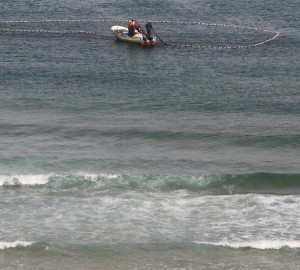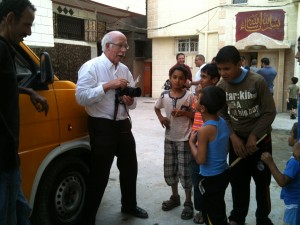Gaza is beautiful
By Gerri Haynes
(Gerri Haynes, a former president of Washington Physicians for Social Responsibility, is sending back reports from inside blockaded Gaza. As she did three times before, Gerri organized a team of doctors and other health care providers to work in hospitals and clinics in Gaza in an effort to directly help the people there and to bring attention to the ongoing humanitarian crisis that the Israeli blockade has created. Second in the series.)
The three physicians in our group spent today in clinics and operating rooms – teaching and consulting. We are busy working on the schedule prepared for us by Amani at the Gaza Community Mental Health Programme. Maxine Fookson, nurse practitioner from Portland, gave a lengthy training and facilitated a discussion for nurses on postpartum depression. In Gaza, where the threat of attack by Israel is constant, women report that giving birth is accompanied by the additional stress of insecurity – will life continue or will it be suddenly ended by another attack from the air?
Still, Gazans say that Gaza is beautiful and, looking out over the polluted water near shore, it is possible to imagine a clean and welcoming sea – one that would offer badly needed fish protein that would be safe to eat. We are enthusiastically greeted again and again by people we have met during previous trips and we are rewarded by the grace and generosity of Gaza’s people.But the trauma of living in the world’s largest open-air prison continues. In a meeting tonight with a child and adolescent psychiatrist and a clinical psychologist from the Gaza Community Mental Health Programme, we heard the term, “Learned helplessness” – the reality that people living under siege learn that even if they are educated and eager to work, the lack of jobs and lack of ability to change the external control on their lives gives them a deep sense of helplessness. Hope lies in the possibility that Gaza will be opened to the world – that politicians will realize the absolute need to free Gaza and allow Gaza’s people to heal. For now, the lack of access to clean water (the water of Gaza is 95% polluted), clean air, safe soil, adequate classrooms for education (children are double and triple-shifted in schools), jobs, adequate housing – the list is long – makes living difficult for these courageous people.

Israel restricts fishing to shallow, non-productive areas along the coast of Gaza (Photo by Bob Haynes).
From the director of the nursing association, we learned that there are many more nurses in Gaza than there are available jobs. More hospital beds are needed (unable to be built because building materials are forbidden). These beds could mean increased placement for nurses and more access to care for the population. Kara Mochan, nurse practitioner, is working on plans to assist with specialist education for nurses here. There are answers to the public health needs of Gaza, but until the power of freedom is granted, the awakening of our conscience regarding their plight compels us to continue asking for help for this land.
RSS feed for comments on this post. TrackBack URI
